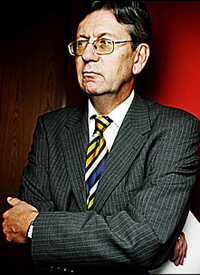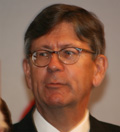Interview Björn Tore Godal
on
Interview Björn Tore Godal ‘We should see developments in the Arctic as a positive possiblity’
The environmental protection of the Arctic should not exclude its economic development, says Björn Tore Godal, Special Adviser for Energy and Climate Issues in the Norwegian Ministry of Foreign Affairs. Godal, one of Norway’s highest ranked and respected politicians and diplomats, who served as Minister in the Norwegian government three times during his career, looks upon developments in the Arctic as ‘a long-term positive possibility’. ‘It’s a positive effect of climate change, amidst many negative effects, that new seaways may be opened up.’
 |
| Björn Tore Godal |
If you think of the Arctic Region, what does come to your mind after the ice melting?
I think of the Arctic in the first place as a wasteland in which nonetheless many people have an interest. We, as Norwegians, share the Arctic first of all with Russia, the US, Canada and Denmark. We are very eager to see the development of the Arctic as a province of peaceful collaboration when it comes to climate, resource management and energy.
It is said that the Arctic harbours between 10 and 30% of the world’s undiscovered oil and gas resources. Are you happy about this prospect or does it worry you?
We should see this as a long term positive possibility, provided that we are able to manage these resources in a way which is responsible and reasonable, both with regard to the climate and to our neighbours. We are very eager to avoid a sort of Klondike development where powers, big and small, chase resources in an irresponsible manner. (Editor’s note: Godal is referring to the disastrous Klondike Gold Rush in northwestern Canada in the late 19th century which ended in a famine.) This is fortunately not the case at the moment. On the contrary, I do believe that Russia, Norway and the other Arctic states are very eager to see the area as one of low tension and responsible management.
In April 2008 the Foreign Ministers of the Arctic states agreed that the Arctic should fall under the UN Law of the Sea. This decision was citicised by many as too vague. Is Norway satisfied with this outcome?
Yes, we are very satisfied. We believe that the Law of the Sea is now recognised by the major players in this area as the prime source of legal management. And this is contrary to the view held by some people, notably in Europe, that this is lawless territory. Some say the area has not been described legally in an adequate way. We think on the contrary, the basic legal instruments have been provided for. What is missing of course is ratification of the UN treaty by the US, but we are happy to see that the present administration is moving on this issue, as was the previous one by the way.
It is known that the obstacle is the US Senate. Do you think that President Obama will be able to
solve this problem?
I hope so and I think so. I believe that even the sceptical people in the Senate will see their national interest best served by ratification. Because it provides legal certainty also for American investments and interests.
There exist quite a few different scenarios for the future development of the region. Which one do you prefer or is from your point of view the most realistic one?
I believe that somewhat contrary to what can be read in some articles, it will be a cautious, long-term development based on the principles of sound management of the resources. Take Russia. It seems to me that the Russians are keen to draw on the expertise of people who have got experience in this area already. But the Russians are moving very slowly.
Is it desirable at all to open the Arctic for oil and gas production and perhaps for new seaways?
Obviously there are many question marks related to this issue. I think that Norway has proven that we can manage drilling and producing fossil fuels under difficult circumstances. However, we are also aware of the fact that the Arctic environment is more vulnerable to incidents than other parts of the world and consequently we should take very small and safe steps. I think it is in Norway’s best interest to pursue a policy of caution, but knowledge and mapping of resources is a good thing in itself, because if you do not know what you are discussing, then discussion tends to be ill-informed. That is why we foresee seismic activities in the Arctic, as we have seen already.
How would you describe the Norwegian-Russian relationship? There is in the Barents Sea a disputed area between Norway and Russia. On the other hand, Norway’s Statoil is participating in the joint-venture with Gazprom and Total to develop the Shtokman field in the Barents Sea.
Well, it has proven to be a positive relationship with a long history. We have maintained a peaceful neighbourly relation with Russia, then the Soviet Union and now Russia again for more than a thousand years. We have never been at war with Russia or the Soviet Union, unlike many other nations.
| ‘We have never been at war with Russia or the Soviet Union, unlike many other nations’ |
Does the question of oil and gas in the Arctic and of new seaways between the Atlantic and the
Pacific cause changes in the relationship between the five Arctic states?
It is a positive effect of climate change – amidst many negative effects – that there is the possibility that new seaways will be opened up. It is a positive aspect of course when it gets easier to move from the American and European continents to Asia. This will be a development which cannot and should not be
| ‘The development of energy in the Arctic will be slower or should be slower than the development of knowledge’ |
The Norwegian environmental organisation Bellona argues that the biggest problem facing
the Arctic is lack of knowledge.
There is definitely some truth in this, but we have academic research institutions in many of the Arctic countries which are providing research on a very high level. I wouldn’t say that there is a big black hole or an empty white sheet of paper. There is a lot which is known, but there is also still a lot to be learned.
It is said that over the last few years military activities have increased in the region. Is this
something you have noticed too?
This has increased to some extent since the revival of Russia. We don’t see it as directed against Norway but as a reflection of Russia’s role as a global partner. We don’t feel fear, it is a relatively normal phenomenon.
Do you see a role for the EU in the development of the High North?
I think so far the individual member states have been more involved than the EU as such. Countries like Britain, France, Germany and Italy have a past in the region, a stronger one than many people realise. On Svalbard we have 10 to 15 countries involved in Arctic research. The EU has a natural role in the area, but one that will be defined by the member states.
What should be on the top of the agenda for the development of the Arctic?
Obviously, science is working at its own pace. We know that scientific resources provided by national governments and the EU in the next few years will be very substantial. The knowledge base will be expanded at a more rapid pace. If we talk about the development of energy, it will be slower or should be slower than the development of knowledge. Caution is necessary for environmental reasons. We still don’t know what resources there are in the region. I believe it is more reasonable to expect an answer to this in 2025 than in 2015.
|
Born in 1945, Björn Tore Godal studied in Britain and Norway. In 1969 he acquired his B.A. in political science, sociology and history at the Univerity of Oslo. In 1986 he became a Member of Parliament, in 1991 Minister of Trade and Shipping, in 1994 Minister of Foreign Affairs and in 2000 Minister of Defence. In 2003 he became Norwegian Ambassador in Berlin. Since July 2007 Godal is Special Advisor for Energy and Climate Issues in the Norwegian Ministry of Foreign Affairs. |


 Who is Björn Tore Godal?
Who is Björn Tore Godal?
Discussion (0 comments)